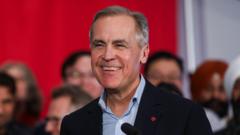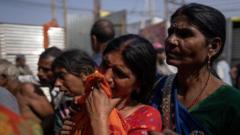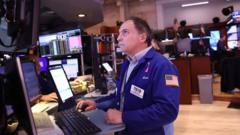As Anura Kumara Dissanayake steps into leadership following a significant electoral victory, he is met with the daunting task of translating promises into realistic actions for a struggling Sri Lanka. His party, the National People’s Power (NPP), gained a historic two-thirds majority in parliamentary elections, showcasing a shift in the political landscape rooted in public dissatisfaction with prior governments. However, as the country grapples with the aftermath of a severe economic crisis, he faces immediate pressures and a tight economy that challenge his ability to implement reforms.
New Era or New Challenge? Sri Lanka's President Faces Economic Reality

New Era or New Challenge? Sri Lanka's President Faces Economic Reality
Sri Lanka’s new president, Anura Kumara Dissanayake, encounters obstacles in fulfilling ambitious promises amid a troubling economic situation.
Dissanayake’s ascent to power came on the heels of a public uprising that ousted former President Gotabaya Rajapaksa in 2022, amidst food and fuel shortages and a staggering national debt of approximately $46 billion. Now, Dissanayake and his government are expected to deliver relief to the populace, which continues to struggle with rising living costs and heavy taxation. Despite his electoral promise of economic negotiation and relief, his recent parliamentary address reveals a need for caution—a stark reminder that managing the unfolding economic reality is a priority over revisiting previous agreements with the International Monetary Fund (IMF).
As he navigates through these complexities, the emphasis lies on restoring public confidence. Citizens like Niluka Dilrukshi express frustrations as prices for essential goods such as rice soar, with little indication that change is forthcoming. Analysts suggest that unless Dissanayake can implement visible changes within a couple of years, public tolerance may wane.
On the international stage, the new administration must also tactfully manage relations with influencing powers like India and China, balancing economic assistance and strategic interests. Describing Dissanayake's foreign policy as pragmatic, experts anticipate a delicate negotiation between maintaining sovereignty while appealing for support from both nations.
As Sri Lanka embarks on this new chapter, the sustainability of Dissanayake’s leadership will depend on his administration’s ability to transition the electorate's hope into tangible improvements for daily life, underscoring the stark realities of governance in crisis.
With the world watching, the question remains: can Dissanayake transform the political shift into effective governance, or will the strains of the past linger?
As he navigates through these complexities, the emphasis lies on restoring public confidence. Citizens like Niluka Dilrukshi express frustrations as prices for essential goods such as rice soar, with little indication that change is forthcoming. Analysts suggest that unless Dissanayake can implement visible changes within a couple of years, public tolerance may wane.
On the international stage, the new administration must also tactfully manage relations with influencing powers like India and China, balancing economic assistance and strategic interests. Describing Dissanayake's foreign policy as pragmatic, experts anticipate a delicate negotiation between maintaining sovereignty while appealing for support from both nations.
As Sri Lanka embarks on this new chapter, the sustainability of Dissanayake’s leadership will depend on his administration’s ability to transition the electorate's hope into tangible improvements for daily life, underscoring the stark realities of governance in crisis.
With the world watching, the question remains: can Dissanayake transform the political shift into effective governance, or will the strains of the past linger?





















